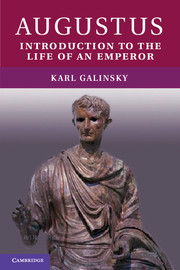Book contents
- Frontmatter
- Contents
- List of Maps, Genealogical Chart, and Illustrations
- Maps & Genealogical Chart
- Timeline
- Note on Major Ancient Sources
- Preface
- 1 From Velitrae To Caesar’s Heir
- 2 Power Struggles and Civil War
- 3 The Experiment of the Principate
- 4 The Challenge of Pax Augusta
- 5 Augustus at Home
- 6 Cultural Vitality
- 7 The Augustan Empire
- 8 The Final Days and an Assessment
- Select Bibliography and References for Further Reading
- Index
- Index of Passages and Inscriptions
2 - Power Struggles and Civil War
Published online by Cambridge University Press: 05 February 2013
- Frontmatter
- Contents
- List of Maps, Genealogical Chart, and Illustrations
- Maps & Genealogical Chart
- Timeline
- Note on Major Ancient Sources
- Preface
- 1 From Velitrae To Caesar’s Heir
- 2 Power Struggles and Civil War
- 3 The Experiment of the Principate
- 4 The Challenge of Pax Augusta
- 5 Augustus at Home
- 6 Cultural Vitality
- 7 The Augustan Empire
- 8 The Final Days and an Assessment
- Select Bibliography and References for Further Reading
- Index
- Index of Passages and Inscriptions
Summary
Caesar’s Heir Asserts Himself
Caesar once, after a blitzkrieg campaign, famously claimed that “I came, I saw, I conquered” (veni, vidi, vici). Octavian’s lightning debut on the Roman scene, when one looks at it in retrospect, may seem marked by similar success: entering Rome in May of 44 BC, he became the youngest consul in Roman history a mere sixteen months later, in August of 43. These months, however, are instructive not for their outcome, which was only the beginning of even greater challenges, but for amply illustrating that this outcome was anything but preordained. It could easily have been different because the amount of variables involved was immense. They were a mosaic of calculations and miscalculations, steps and missteps, sudden vicissitudes that required instinctive response, and both human actors and turns of events that were not susceptible – there and then – to the kind of careful analysis that is afforded to historians later. Certainly, a major reason Octavian prevailed was his determination. At the same time, he was at the mercy of circumstances that were not easily controlled.
After the Ides
What was the situation like after Caesar’s death? Who were the major players who could influence events? We can begin with Brutus and Cassius. As Shakespeare’s Antony said, they were honorable men – denizens of Cyprus, whom Brutus charged 48 percent interest on loans, might have had a different perspective – but their action exemplified the shortsighted mindset typical of their class: they had no constructive program whatsoever. Happy days would simply return after Caesar was out of the way. In essence, we are looking at a major reason both for the failure of the Republic and the failure of their coup. Caesar was dead, but the problems that had beset the Roman Republic for several decades did not die with him. In Rome, the urban plebs, numbering in the hundreds of thousands, continued to be a volatile mass, even though or precisely because they were on the dole. The army of some 500,000 had gotten used to fighting civil wars as much as foreign opponents, and most of the soldiers had greater allegiance to their commanders, who could deliver the goods, than to the res publica, the commonwealth. Further, Rome had long ceased to be a small city-state on the Tiber and could not be governed as if it still were.
- Type
- Chapter
- Information
- AugustusIntroduction to the Life of an Emperor, pp. 20 - 60Publisher: Cambridge University PressPrint publication year: 2012



